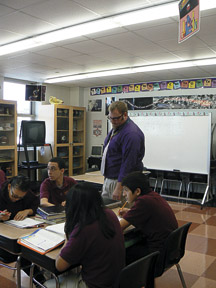Students who needed extra help with math and language arts skills traditionally were pulled out of the classroom and taught by basic skills teachers. But now two North Bergen schools are part of a pilot program in which those same teachers come into the classroom to aid those who need extra help.
The program, being held at Franklin School from first through fourth grades and John F. Kennedy School from fifth through eighth grades, has cost the district around $20,000 and is being conducted by Rutgers University’s Center for Effective School Practices.
Talks about the program began last spring. Then Callisto Bradeson, an adjunct professor for Rutgers who conducts field research, met with Superintendent Robert Dandorph and other administrators who will be involved in the program.
“It’s starting to pay off now.” – John Pein
________
At Kennedy School, two basic skills teachers who once would have pulled particular students out of the classroom for additional help in mathematics or language arts now go into the fifth through eighth grades and work hands-on with the other teachers and their students.
“This is something that I think is very, very effective in this area that we live in,” said Guasconi. “Kids come from all different backgrounds and come to us and we have to educate them, so we’re excited.”
Guasconi said that out of Kennedy School’s 515 students, about 100 are classified as basic skills students.
While the program has only been functioning for three weeks, he said the benefits are already obvious.
District Reading Coordinator Carol Bernasconi, who is housed at Kennedy, said that teachers who once rarely interacted are making assessments on students and planning their lessons together.
Peer development
Guasconi said that for younger students, being pulled out of the classroom for basic skills teaching can sometimes feel like a field trip, while for older students this can become a “logistical nightmare” since they switch classes and have classes throughout the building.
Bernasconi said that teachers have remarked that students who once lost interest in subjects now are more interested in school.
They also are no longer separated from their fellow students.
“The benefits of [students] staying with their peers is that in North Bergen we are very diverse,” said Bernasconi. “We have diverse backgrounds, we have multi-lingual students of all different languages and varying interest and ability, so when they stay in the classroom, no matter what their academic [ability or] I.Q., they are learning from each other. They are not ostracized.”
The teachers also feel they benefit from the pilot program. Teachers with different styles are collaborating on how to reach children and they no longer feel like they are the sole responsible person on the job, said Bernasconi. She said that the district has a school-based development program in which teachers can voice the changes they think should be made as well, which has united everyone to a common goal.
Teachers involved in the pilot program have a support system at Rutgers as well.
Reaching students
Guasconi hopes to be able to expand the push-in program to other grades.
John Pein, the school’s math-certified basic skills teacher who is taking part in the pilot, said that the first few weeks were nerve-wracking, with teachers afraid to step on toes, but now a rhythm is in place.
Ideas are bouncing back and forth, and students are seeing more than one way to attack a problem. The same students who once had their heads down are now paying attention.
“It’s starting to pay off now,” said Pein. “Both teachers are giving them what they need.”
Guasconi explained that this style of teaching is even more essential, since students receive state testing from third through eighth grades and beyond. Pulling a student out of a classroom every day can affect their attention on subjects and their scores on standardized tests.
“I could stand up there and do a lesson in math and walk out of that classroom and want to pat myself on the back and say I aced that, but if those kids are sitting there and thinking ‘What did he just teach?’ I just wasted a whole period of education, because they didn’t understand what I was explaining, and that’s what it’s all about,” said Guasconi.
Tricia Tirella may be reached at TriciaT@hudsonreporter.com.
